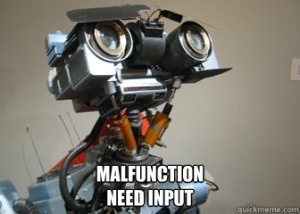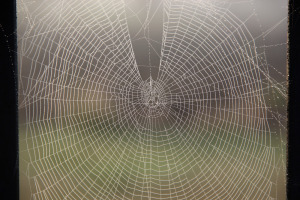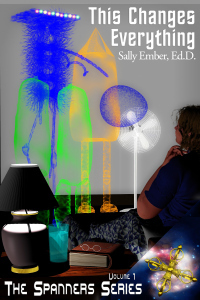Sally Ember's Blog, page 130
January 20, 2014
My #Writing Process: Revealed!
“Where do you get your ideas?” is the most-asked question of creative people. I’ve been paying attention to my own #writing process since people started asking me that more often. I now know I have three distinct phases for my creative process, but they are not entirely linear in sequence.
Without even consciously knowing I am in it, I am often in the incubation period, phase one for all creative endeavors. This assumes ground zero is pre-phase one, the part in which I determine I’m open to creating and what I want to create, in a general way.
For me, the incubation period is highly receptive. I am like a sponge; I am seemingly almost indiscriminate in my voracious appetite for information, as in Short Circuit‘s Johnny Five’s demands for “more input.”
Phase one includes: getting cognitive but silent input from reading fiction and nonfiction books and magazine or ‘zine articles and blog posts; visual/emotional/audio content input from watching films/TV, TED talks and videos via Facebook, youtube, Google+, blogs and other sources; musical inspiration gleaned from radio, Spotify and other online music players, playing piano, singing; conversing with friends, family, strangers and acquaintances. All of this sparks thousands of ideas.
Next comes the internal percolating, still incubation, from all input and other connections being made. Percolating occurs while: dreaming, meditating, thinking, contemplating, swimming, walking, driving. I love this part: although most of it is invisible, it is palpable. I feel buzzed: re-routed, re-programmed, inspired, electrified. I often feel as if I am in a remembering or retrieval mode, recalling and almost hearing or seeing what I’m about to write as if it’s already written.
Inevitably, I get woken up from sleep or can’t fall asleep because these first gems of ideas are starting to surface and I MUST write them down. I hear them narrated or see them in paragraphs. I make lists, gather URLs and quotes, write down remembered dreams and conversations, make mini-outlines, generate summaries and plot intentions, describe characters and do many other cultivating things with the seeds already planted.
I have to move quickly; these deliveries are clear and sharp at first, but the longer I wait or the longer it takes to put them into form, the weaker the connection or recollection gets. This phase is very exciting but also quite frustrating. I feel as if I only get to write down or collect about half of what I receive.
I am now in phase two: full writing mode. I’m generating and composing my ideas into text. Organizing, whittling, deciding, creating connections are now dominant. Characters, plots, dialog, events, circumstances, facts and conflicts all converge in seemingly random and chaotic ways until I can sift through and wrest them into some order. It feels as if I’m gathering spiderwebs, tantalizing aromas and musical notes and transforming them into particular words, coherent paragraphs, comprehensible stories.
Once I start writing them down as lists or collect ideas into documents and folders for later use, I am compelled to follow clues, leads, research trails. These lead to more input and ideas, and those lead to further incubations, more percolating, etc.
These first two phases loop many times until the ideas erupt from me, birthed into existence as writing. I hate to be interrupted when I’m on a trail.
However, I love and crave, even make my own interruptions in the next part, the testing period of writing. I reach out to people to talk things out, hear ideas or dialogue aloud for the first time, getting first bounce-back reactions and more ideas from these interactions. I call certain people many times: my son, my mom, my sisters, a niece, some friends. I post questions and comments online and get responses from strangers/acquaintances. Suggestions, critiques, future-use ideas all welcomed, here.
Eventually, the input receiving slows down and the output starts to take precedence. I spend more time writing than researching. This is the highest output part of the process, generating most of the writing. Much of what I generate may not get used, or not used for this immediate project, but I keep it all.
I have dozens of drafts, pieces, drafts of chapters and whole volumes for The Spanners Series in folders that may be mined for future Volumes if not used for the one I’m currently writing. I leave myself gifts and find them later. When I was ready to write Volume II, I was shocked to discover that I had already written large chunks of it while writing Volume I and didn’t even remember having done so much writing for that Volume!
Phase three involves combining, rewriting, generating, refining, selecting, drafting and completing the work. I spend more time revising than creating, which means I’m in the third phase. I do get new ideas and do more research during this final phase, in many of the same ways, but the proportions reverse from the earlier phases.
Some people call these three phases Prewriting, Writing, Revising. Works for me.
Steven Johnson’s TED talk from 2010: Where good ideas come from, in which he ends with “Chance favors the connected mind,” describes a lot of what I experience. I love that quote.
http://www.ted.com/talks/steven_johnson_where_good_ideas_come_from.html
Good luck with your writing!

January 18, 2014
Was Einstein a Buddhist?
 Reblogged from The Responsive Universe:
Reblogged from The Responsive Universe:
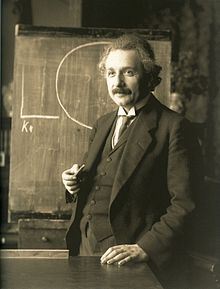
Albert Einstein was born on March 14, 1879 and is well-known for his scientific research in modern physics. Famous for his theory of relativity, much of his exceptional work is still considered a benchmark in the modern world of quantum science.
Across Facebook and Twitter I always see philosophical and even spiritual quotes from Einstein that not only portrayed him as a scientist but also as an awakened being.
Of course any thinking person who studied Buddhism would see the correlations and similarities between Buddhist science, thought, philosophy and precepts to physics, astronomy, psychology, sociology and many other disciplines!
January 17, 2014
Are We Practicing Vajrasattva With Its Original Intention?

Vajrasattva mantra and practice are more than karma purification. Typically, the practice is taught in this manner in most Tibetan Buddhist sects. However, I wish to include another element to Vajrasattva that is not always discussed and may deepen our practice.
First, the history of Vajrasattva originates probably from Indian Buddhism sources with the original mantra spoken and written in Classical Sanskrit.
Thanks, OkieBuddhist! This relates exactly to the portion of my miniretreat in which I am studying Dzogchen practices (t'hregchod and t'hodgal) and enhances my understanding well. May all beings benefit.
#SciFi and #Fantasy #Books into #Films Upcoming
READ THEM NOW, WATCH THEM LATER: SCIENCE FICTION, FANTASY AND HORROR ADAPTATION WATCH by John DeNardo on January 15, 2014 | Posted in Science Fiction and Fantasy
John DeNardo is the editor of SF Signal, a Hugo Award-winning group science-fiction and fantasy blog featuring news, reviews and interviews. You can follow him on Twitter as @sfsignal.
Read these books, then go see this year’s film adaptations:
Divergent by Veronica Roth
Wool by Hugh Howey
Beta by Rachel Cohn
More about each here, including DeNardo’s summaries, opinions and links:
https://www.kirkusreviews.com/features/read-them-now-watch-them-later-science-fiction-2/

January 16, 2014
Like on LinkedIn by 1/21/14 PLEASE!
TCE needs 32 more votes to be entered in contest. Thanks!
http://www.linkedin.com/groups/CONTES...
“5 Wonderful Stars” for #THISCHANGESEVERYTHING!
Another 5-Star Review! for This Changes Everything, Volume I, The Spanners Series.
Review and comments from Sandra Love, https://www.goodreads.com/author/show/7339622.Sandra_Love:
“Hello I really love this book. It was intriguing and well-written.”
She gives it “5 Wonderful Stars” and writes:
“First, I received a copy of this book exchange for an honest review.
“I really did enjoy this book I thought it was intriguing, brilliant and it held my interest from page 1 until the last word. I love reading about Clara Branon, who was visited by aliens one night, and wow it got very exciting. I truly believe in aliens and other worlds so this book was a book I would have read anyways. The details that Sally put into this book were amazing, and if I could have given her more stars, I would have.
“If you like sci-fi, fantasy and or aliens this is the book for you. I do recommend this book and I hope you try it because you won’t be disappointed.
“Well done, Sally! I look forward to your future books!!”
Buy links, excerpts and more: http://www.sallyember.com

January 15, 2014
Top 10 Scientific Benefits of Compassion
To view correctly, please click the image and then click again to magnify!
Excellent! Everyone and the planet and all beings benefit!
Full Moon Meditation: 8 pm ET today
 Reblogged from The Practice of Living Awareness:
Reblogged from The Practice of Living Awareness:

Click here to join just before 8 pm ET.
Full Moon #Meditation for #peace, worldwide, 5 PM EST. Join in!
25 Examples of Real-Life Superheroes That Rescued Others
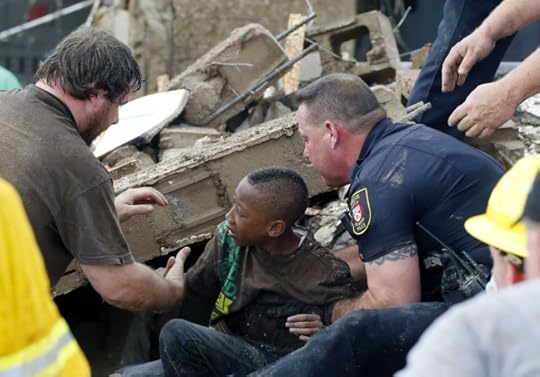
























A boy is pulled from beneath a collapsed wall at the Plaza Towers Elementary School, on May 20, 2013.
Bijlee, the 58-year-old ailing elephant rescued by individuals and NGOs sometime back, Mumbai, India.
Fisherman Gernot Quaschny rescues a deer from the floods near Schoenhausen, Germany, on June 12, 2013. Due to a broken dike on the Elbe River, several villages in the area were flooded.
I love reading about kindness, courage and compassion in action. Thanks for posting! I'm reposting!
January 14, 2014
Another Friend’s Death: Mortality in Daily Life
We #Buddhists contemplate, study, meditate on and live with #impermanence more than non-Buddhists, for the most part. We do not, therefore, feel as much surprise, shock, dismay, or indignation when relationships end, jobs evaporate, housing changes, animals and people die: that is the nature of impermanence, which we all live with every day. Mortality in daily life is commonplace.
However, that doesn’t mean we do not mourn. We feel sad, we grieve, we suffer personal or professional losses, same as anyone. We’re just not surprised. We don’t ask “why me?” or “why her?”
I lost another long-time friend, Cynthia Toth, a former housemate who is a Buddhist vajra sister this week. I say “another” because she is not the first and she will not be the last. But, she is my age. Somehow, when someone dies who is a peer, it feels “closer to home” in every way. Also, we had lived together in a Buddhist community household for almost a year, which literally brings this loss closer to my own home.
Cyn had been suffering from the aftereffects of ovarian cancer for several years and it actually surprised me that she lived as long as she did. Most with that diagnosis do not survive that long nor live as well as she did for the years they do have left. I admire Cynthia’s courage, applaud her support network and health care providers, and am glad she had that “extra” time because I know she used it well, in service and kindness to others.
This post is not an obituary for her (I am not qualified nor moved to write one), nor even an homage. More, I want to recognize our commonality: everyone dies. One way or another, “early” or after a long life, we all leave our physical bodies.
I have come close to death many times, due to accidents, illness and surgeries. At some point, that closeness will veer over the line into actuality and I, too, will die. Since I am almost 60, no one can say that I would have died “young,” regardless of when I die from now on. But, the older one gets, the “younger” every decade seems or sounds.
When we’re teenagers, being in one’s twenties seems “old” and anyone over forty seems “elderly.” Once in our twenties, we revise that to include people in their forties seeming “middle-aged” and those over sixty seeming “elderly.”
Now, sometimes people in their eighties don’t seem so old to me; dying in one’s nineties can seem “too soon” in some cases. When is anyone “ready” to die if they’re not in pain, not suffering, not alone? Even those who do suffer hang on, as if death were a consequence to be avoided.
The language we use to talk about one’s journey to death is so inappropriate, from my perspective: people talk about the dead person having “lost the battle” when death comes from cancer or other illness; many say a person has been “robbed” or had a life that has been “cut short” when the person was murdered or died from an accident. Even when someone dies of “old age” many talk about how we “lost them too soon,” as if remaining alive well into one’s 90s means we’re “found.” People talk about “cheating death,” “escaping death,” and mortality rates.
My favorite is the epidemiologist who tells us that the incidence of death has increased or decreased due to lifestyle or medicinal interventions or changes, ignoring the fact that everyone dies, which makes the incidence of death 100%, for everyone.
I am not hard-hearted: I cried when I learned of Cynthia’s death….and Russell’s and Jaye’s and Joan’s and Mary’s and Bob’s and Susan’s and Martha’s and Rinpoche’s and my father’s and my grandparents’ and Marcia’s and and and and so many others. I miss them. I wish some of them hadn’t died “so soon,” but I know some of them were suffering, which made their deaths a relief.
I cry, but I am not shocked or surprised. I celebrate their lives and am glad to have known them.
Thank you, Cynthia, for being in my life for a few years and all the ways you were of benefit to so many. I wish you well in your journey to your next incarnation. Maybe we’ll get together again some time.
Thanks, Candace Palmo, for posting this photo of Cynthia from your travels last year. Cynthia is on the left.


